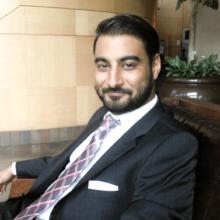Alim Fakirani
Why did you decide to pursue a graduate degree?
Pursuing a doctorate was a dream a decade in the making. Since having completed two master-level courses at the Institute of Education - University College of London, I had wanted to further my education by pursuing a PhD. It was after working in the classroom alongside many refugee, immigrant, first generation, and minority students that my research topic came into focus. After presenting research at Congress for the Humanities and Social Sciences hosted by UBC in 2019, I was bit by the academic bug. Being around such talented and cutting edge researchers in UBC's impressive and unique campus inspired me to pursue this life-long dream.
Why did you decide to study at UBC?
UBC is Canada's premiere research university. Having already completed undergraduate and graduate studies in some of the world's most renowned schools, I wanted to pursue a doctorate at a university that would continue to build on the knowledge and skills that I was fortunate to gain in my previous university experience. Having moved to Vancouver recently, I wanted to continue my studies locally and was fortunate that such an academically rigorous school was located close to me. UBC also stands out for the breadth of the scholarship it produces and for attracting some of the best talent within its faculties. I was also very fortunate to have established a relationship with Dr. Penney Clark, who now serves as my research supervisor, prior to applying to UBC.
What is it specifically, that your program offers, that attracted you?
The relationship I have with my supervisor and the quality of scholarship that the Department of Curriculum Studies produces are prime motivators in wanting the attend UBC. The Faculty of Education, along with its various departments, work cohesively and in support of the entire faculty and its students. Having been awarded UBC's top scholarship (the 4YF) allowed me to pursue my studies while also being able to afford it financially.
What was the best surprise about UBC or life in Vancouver?
Unfortunately, my studies commenced at the start of COVID and I lost out on a lot of typical experiences that students undergo. Most of my classes were online. I did manage to take a couple of classes in person. Despite these circumstances, the quality of instruction - whether online or in person - was top-notch. As an educator, pedagogies that excite and inspire are necessary in capturing and motiving students in their studies. My profs were not only experts in their respective fields, but also fantastic teachers. Once I did make it on campus to take courses, I was really blown away by the UBC campus. I've been fortunate to have frequented many university campuses but UBC's is unparalleled. The proximity to the water, surrounded by trees, with constant investments in UBC's infrastructure are unique to UBC and are a source of pride for myself as a student attending UBC.
What aspects of your life or career before now have best prepared you for your UBC graduate program?
As I mentioned earlier, taking time between the completion of my master degrees and the start of my PhD was helpful in providing me real world experience that helped inform the topic of my research. That said, it also means that in the interim, I had to continue to pursue academic goals such as publishing, presenting at conferences, and attending a variety of academic and professional development courses. These things all helped in keeping me motivated to continue to pursue my studies. I also think being around like-minded people, or at least being around people who also had/have similar desires to pursue a doctorate,, is very helpful. My wife had completed her doctorate several years before I got the pursue mine. Learning from her experience was incredibly helpful. That said, everyone's experience will differ but being able to chat with someone who has gone through the hardships and successes that come with doctoral studies can be beneficial.
What do you like to do for fun or relaxation?
I have two young children, so spending time with them brings me immense joy and fulfillment. They are a constant reminder as to why I decided to pursue my PhD. Going out to parks or exploring the city with them is always fun. I also enjoy going for walks and hitting the gym when I can.
What advice do you have for new graduate students?
Where to begin! The first thing I tell prospective students who have asked me about my experience is to have a solid idea of what you want to research. Deciding on a research topic takes time. Topics that are borne out of real life and lived experiences might make for more interesting research. On this same subject, selecting a topic that speaks to real world issues and realities can be helpful. Connecting your research to the world can not only inspire you but it can allow your research to interrogate/inform/alter complex social realities in the world we live in. Also keep in mind, the topic you select will be one that you will be spending a lot of time exploring and researching, so picking something that you are passionate about and that can sustain your interest and curiosity for the duration of your studies is important. My second piece of advice: try to locate a potential supervisor prior to applying for a program. The relationship you have with a supervisor is crucial in this process. Finding someone who shares your interests is very important. They will be your biggest supporters at every step of the journey.
